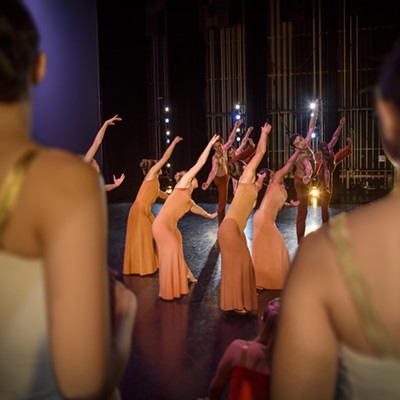It is magic, of an unusual sort.
And it is definitely rough, both the proceedings and the script which gives them birth.
Winding Road Theater Ensemble most assuredly exhibits truth in advertising as it brings us "Rough Magic" a very bizarre play by Roberto Aguirre-Sacasa.
Some of the bizarre aspects are confounding; some are, well, simply bizarre. But a lot of them are pretty damn funny.
The story has married elements from Greek mythology, Shakespearean drama, action movies, comic book heroes and heaven only knows what else. It's an unusual bonding and we know it will end unhappily in a happily-ever-after kind of way.
The theater company was going to produce Shakespeare's "The Tempest" in this slot of their season, but have ended up producing a play in which the story of that play becomes the trampoline on which Aguirre-Sacasa's acrobats bounce and fly and dismount in a tie-dyed, bad dream, Halloween-gone-wild kind of way.
The scene is set with a bit too-scary professor testing her class (us) about whether we've done our homework investigating "The Tempest," with Prospero and his magic and such. Then we meet Melanie (Cyndi Lafrese), in her mid-to-late 20s who is meeting a genetically pre-disposed teenage lifeguard for a drink. How and why this situation came to be we really don't know, and, actually, if you're the kind of person who wants to know the reason behind things, this is probably not the show for you. Melanie has become a dramaturge, (naturally?) with an extra bit of talent for releasing characters from their fictional and/or fantastical home.
When a very athletic Caliban (Andrew Gray), son of Prospero, having escaped Shakespeare's story and appears in the present clutching Prospero's book of magic, strange—and that would be laugh-out-loud-funny strange—things begin to befuddle, beguile and bemuse us.
Susan Arnold has worked a bit of magic herself by getting this piece up and running. And the actors, who for the most part are actually quite good, seem to have had a wonderful time creating these characters—from the aforementioned to a Steve Wood—created Tisiphone, Bree Boyd (Sasia) and Eddie Diaz (Ariel). David Alexander Johnston is a pretty damn scary Prospero who definitely has his panties in a bunch. The technical and design aspects are quite well done, particularly Glen Bucey's set. It's all crazily magic. Or magically crazy.
In the end, Aguirre-Sacasa gets in his own way and the play rocks and rolls too much. But this production is interesting if not quite intelligible.
Hmm. Let me put it this way: It's sorta like a cross between a seedy Rogue Theatre and the Gaslight Theatre, without the popcorn. And you know that would be quite a love-child.
Stephen Sondheim loves puzzles. He has a huge collection in his home and for years was rarely seen without a New York Times crossword and a pen in his hand.
His musicals often have the quality of a puzzle, whether it might be a variant of a word game with his who-says-you-can't-use-intelligent-words-and-conceits-in-musical-theater lyrics. (do you know of another musical theater lyricist who has used the word "ameliorate" in a tune?), or how he so skillfully fits pieces of songs and scenes within and without others. There's a complexity and depth in his music and lyrics that challenges both audiences and the artists that bring us his work.
So what a pleasure it is for the young collegians in the University of Arizona's theater program to be given an opportunity to experience the process of performing such a piece like Sondheim's "A Little Night Music," considered by many to be one of Sondheim's best efforts.
The story (Hugh Wheeler wrote the book for the musical) is based on Ingmar Bergman's "Smiles of A Summer's Night," and although the story is clever and captivating, it's the feel of the piece which you carry with you when you leave the theater. There are almost haunting echoes in its themes of the blurring of time, of change, the vagaries of memory, of a sense of place.
The tale involves a respected (and wealthy) middle-aged lawyer, Fredrick Egerman (Charlie Hall), who marries Anne (Taylor Pearlstein), a very virginal young woman who has chosen to stay that way after marriage, not with hostility but timidity. His son, Henrik (Josh Dunn), a theologian in training, feels overlooked and invalidated and hopelessly in love with his father's new wife. Meanwhile, years after having had a liaison with Desiree Armfeldt (Audrey Roberts), a now aging performer who may just be done with life on the road, Egerman seeks her out when her tour hits town. There is indeed still a connection. That doesn't mean that she hasn't had other lovers, including Count Carl-Magnus Malcolm (Micah Bond), a strutting egoist who suspects Desiree might be consorting with another. His wife, Charlotte (Sarah Ambrose), is caught up—but not quite helplessly—in Carl-Magnus' version of the world. Madame Armfeldt (Grace Kirkpatrick), Desiree's aging mother, issues invitations to join her in her country manner in which the perpetual dusk of Sweden's summer incites an unraveling of the straight-laced but sordid mess.
It's a very adult play, and these young adults can't be expected to bring experience and a genuine sense of world-weariness to their characters. But they bring what they have, and that's genuine talent and training and love for what they are doing.
A quintet-Aaron Arseneault, Brian Klimowski, Cecilia Iole, Carolyn Fluehr and Sydnee Ortiz—sets the tone and guides us, musically, of course, through this world of loves and desires and youth and age. They perform some very difficult music beautifully, as do most all of the actors under Monte Ralstin's musical direction. The well- conducted orchestra performs offstage.
Director Miranda Crispin has nudged all the aspects of the production together, but not necessarily seamlessly. Richard W. Tuckett's period costumes are first-rate, while M Erdman's set is just OK.
Of course there are some issues, and one is that while we get the story, the nuances that conspire to create the rich and haunting depth of feeling built into the piece are slight. That said, there is nothing to prevent one from being thoroughly entertained and from time to time even a bit transported. It's an admirable rendering of the work of a legendary composer/lyricist, perhaps the best to ever conceive and deliver such musical theater mastery.








